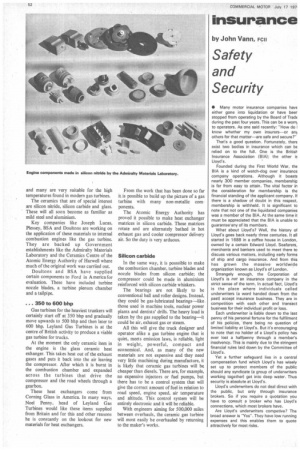insurance
Page 54

If you've noticed an error in this article please click here to report it so we can fix it.
by John Vann, FCII
Safety and Security
• Many motor insurance companies have either gone into liquidation or have beer stopped from operating by the Board of Trade during the past four years. This can be a worry to operators. As one said recently: "How do I know whether my own insurers—or any others for that matter—are safe and secure?"
That's a good question. Fortunately, there exist two bodies in insurance which can be relied on to the full. One is the British Insurance Association (BIA); the other is Lloyd's.
Founded during the First World War, the BIA is a kind of watch-dog over insurance company operations. Although it boasts nearly 300 member companies, membership is far from easy to attain. The vital factor in the consideration for membership is the financial standing of the applicant company. II there is a shadow of doubt in this respect, membership is withheld. It is significant to note that not one of the liquidated companies was a member of the BIA. At the same time it must be appreciated that the BIA is unable to guarantee`any of its members.
What about Lloyd's? Well, the history of Lloyd's goes back nearly three centuries. It all started in 1688 in a coffee house in London, owned by a certain Edward Lloyd. Seafarers, merchants and bankers used to meet there to discuss various matters, including early forms of ship and cargo insurance. And from this has grown the massive worldwide organization known as Uoyd's of London.
Strangely enough, the Corporation of Lloyd's is not an insurance company in the strict sense of the term. In actual fact, Lloyd's is the place where individuals called underwriters (a word handed down from the past) accept insurance business. They are in competition with each other and transact business for their individual profit or loss.
Each underwriter is liable down to the last penny of his personal fortune for the fulfilment of his policies, there being no question of limited liability at Lloyd's. But it's encouraging to note that no holder of a Lloyd's policy has ever lost a halfpenny through a member's insolvency. This is mainly due to the stringent financial rules laid down by the Committee of Uoyd's.
Yet a further safeguard lies in a central compensation fund which Lloyd's has wisely set up to protect members of the public should any syndicate (a group of underwriters working together) get into deep water. Thus security is absolute at Lloyd's.
Lloyd's underwriters do not deal direct with the public, but only through insurance brokers. So if you require a quotation you have to consult a broker who has Uoyd's connections, which most brokers have.
Are Lloyd's underwriters competive? The broad answer is "Yes". They have low running expenses and this enables them to quote attractively for most risks.








































































































